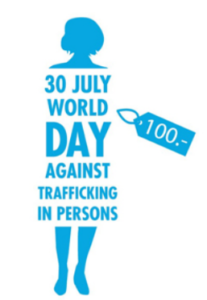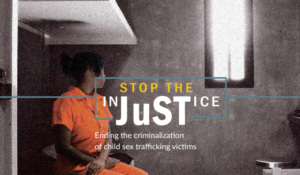 By Marissa Gunther, Director of Growth Strategies, Shared Hope International
By Marissa Gunther, Director of Growth Strategies, Shared Hope International
Perhaps you’re familiar with the fable of the man and the river?

The story is commonly told like this: A man sits peacefully on a grassy slope that rolls into a river’s edge, his family picnicking and playing nearby. As he listens to his children’s laughter, their shrieks of joy echoing off the hillside, a different more desperate sound breaks through.
A scream. Help!
Alarmed, the man frantically looks for the source and finds it coming from the river. A girl, no older than his own young daughter, is fighting for her life as the current sweeps her downstream.
Without thinking, the man takes off running down the slope into the icy waters and grabs the young girl before it’s too late.
Now, back at shore, the man wonders with wild confusion…How did this happen?
But before he can ask the frozen and exhausted child any questions, he hears another scream. Then another. And then another. The man looks back at the river to find dozens of children, girls and boys, hopelessly clambering to stay afloat as the river washes them away.
 He quickly realizes that he can’t save all of the children alone. He needs more help.
He quickly realizes that he can’t save all of the children alone. He needs more help.
He yells for other picnicking families from his village to join him in the rescue attempts – the village begins swimming as quickly as possible to rescue each child.
Soon rescue teams and fire trucks arrive, and out jumps the fire chief. She takes one long look at the situation and begins to run up the river, realizing that somehow, for some reason, the children keep falling in the river upstream. There is where she will find the source of the problem.
Like the fire chief, we too must hurry upstream and address the source.

For over 20 years, Shared Hope has been pulling children out of the deadly river that is child sex trafficking through restoration and empowerment. Currently, we’re providing funding and technical assistance to partners in India, Nepal, Jamaica and in the United States that provide safe housing, medical care, education, vocational training, and therapeutic services.
But someone – somewhere – is creating a demand for the children and vulnerable adults we’re helping. More and more children will fall into the river unless someone fixes the source.
We will not quit until every child is safe.
 And so, we support the United Nation’s global plan of action and will celebrate World Day Against Trafficking in Persons on July 30. We see this day not just as an occasion, but as an opportunity to educate the public about the scourge of human trafficking, to mobilize a political force and the resources needed to truly address the source of the problem, and to celebrate the achievements of the abolitionists of today and survivor leaders who bravely speak out and stand up to this evil. [easy-tweet tweet=”We support the United Nation’s global plan of action and will celebrate World Day Against Trafficking in Persons on July 30.” user=”SharedHope” hashtags=”SharedHope, StoptheInjustice” url=”https://www.un.org/en/events/humantrafficking/” template=”dark”]
And so, we support the United Nation’s global plan of action and will celebrate World Day Against Trafficking in Persons on July 30. We see this day not just as an occasion, but as an opportunity to educate the public about the scourge of human trafficking, to mobilize a political force and the resources needed to truly address the source of the problem, and to celebrate the achievements of the abolitionists of today and survivor leaders who bravely speak out and stand up to this evil. [easy-tweet tweet=”We support the United Nation’s global plan of action and will celebrate World Day Against Trafficking in Persons on July 30.” user=”SharedHope” hashtags=”SharedHope, StoptheInjustice” url=”https://www.un.org/en/events/humantrafficking/” template=”dark”]
Research spanning multiple decades, including data collected by both Shared Hope and the UN reinforce the fact that human trafficking is a global problem and no country is immune to it. Millions of victims fall in to the hands of traffickers, lured by fake promises and deceit, and fueled by the economics of market demand.

Data also shows that trafficking happens all around us. According to the 2018 UN Global Report on Trafficking in Persons, the number of victims trafficked within their own country has doubled in recent years to a staggering 58% of all detected victims. Note that these numbers exclude the millions of suspected unreported cases.
In response, government entities around the globe have passed laws that aim to protect victims and hold offenders accountable. However, even with laws on the books, including laws passed at the state and federal level in the United States, victims continue to be trafficked and criminalized while the crimes of traffickers go unpunished.
 Astonishingly, over one third of the states in the US lack laws that would prevent minor victims of sex trafficking from being criminalized for the crime of prostitution rather than ensuring they receive a protective response and specialized, trauma-informed services.
Astonishingly, over one third of the states in the US lack laws that would prevent minor victims of sex trafficking from being criminalized for the crime of prostitution rather than ensuring they receive a protective response and specialized, trauma-informed services.
Yes, you read that right.
Child sex trafficking victims in the US are still being arrested for the crime committed against them.
So tomorrow, Shared Hope stands with the United Nations and celebrates their decision to focus 2019 World Day on highlighting the importance of government action in the interest of justice for victims.[easy-tweet tweet=”Shared Hope stands with the UN and celebrates their decision to focus 2019 World Day on highlighting the importance of government action in the interest of justice for victims.” user=”SharedHope” hashtags=”SharedHope, StoptheInjustice” url=”https://www.un.org/en/events/humantrafficking/” template=”dark”]
And, like the fabled man and his village, we are running full speed towards UN’s call to action – PREVENTION. Everyone, not just government entities, can take action to stop children from ever falling into the dangerous and brutal river that is sex trafficking.

We can, together, mobilize our own village of hope.
So you might be thinking…
Yes, yes, YES! Trafficking is a big problem and it will take a big village. So where is my place in all of this?
Shared Hope has a pathway to action for you. Right where you are, as you are.
Consider the following actions as a great place to start:
- Become well educated on the issue and learn as much as possible about what life is really like for trafficking victims. Take time to learn about the conditions that foster trafficking, and how this dark marketplace is fueled by buyers who pay traffickers to supply victims to meet their demand. Then educate others. As a place to start, we recommend reading or listening to the audiobook Renting Lacy by Linda Smith, which details eye-opening information based on real victim stories of youth bought and sold within the American commercial sex trade. Share the book with others when you’re done.
- Learn the warning signs and how to respond responsibly. To get you started, you can visit SharedHope.org to access several downloadable, free resources on warning signs and how to take action. You can report suspected child sex trafficking to the National Center for Missing and Exploited Children (NCMEC) at 1-800-THE-LOST (843-5678).
- Volunteer your time and talents. Shared Hope offers many on-ramps to taking action. Easier still, you can get started in any place that is comfortable to you, at your school, faith community, social media group – even in your own home. Our Ambassadors of Hope are trained and supported volunteers who carry the torch of prevention education into their communities, their voices causing a culture changing ripple effect across the nation. Join our team today!
- Your voice matters and can make a difference. Legislative advocacy is an effective tool that can strengthen legal protective responses to victims, ensure pathways to social services for survivors, and hold buyers and traffickers accountable. If you feel moved to learn more about the laws combating sex trafficking in your state, visit our legislative action center.
- Give a gift of hope. Your giving empowers Shared Hope to continue our work to eradicate child sex trafficking through prevention, restoration and bringing justice. You can make an impactful, tax-deductible donation to Shared Hope here.
We hope you’ll join us tomorrow, the 30th Day of July, as we run upstream, carrying forward our mission to end child sex trafficking.
We believe that together we can end human trafficking once and for all.






